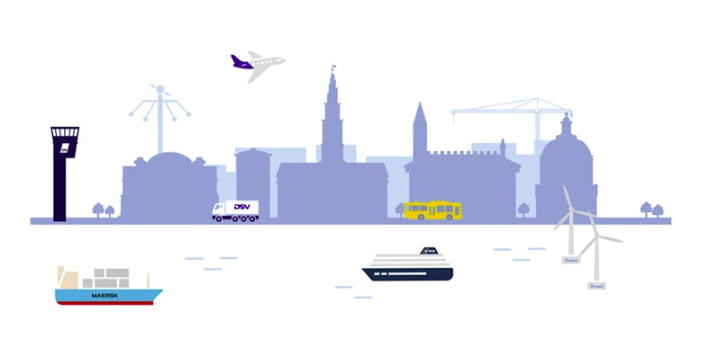A consortium of Danish transportation companies has formed a first of its kind partnership to develop an industrial-scale production facility to produce sustainable fuels for road, maritime and air transport in the Copenhagen area.
The partnership, including Copenhagen Airports, A.P. Moller – Maersk, DSV Panalpina, DFDS, SAS and Ørsted, aspires to create one of the world’s largest hydrogen and e-fuel production facilities as soon as 2023.
When fully scaled-up by 2030, the project could deliver more than 250,000 tonnes of sustainable fuel for busses, trucks, maritime vessels, and airplanes every year.
Production would potentially be based on a total electrolyser capacity of 1.3 gigawatts, which would likely make it one of the world’s largest facilities of its kind. The production from the fully scaled facility can reduce annual carbon emissions by 850,000 tonnes.
As such, the project can spearhead the maturation of sustainable fuels while creating jobs and new value chains to reinforce Denmark’s role as a green energy leader.
COWI and BCG act as knowledge partners for the project, and the project is supported by the Municipality of Copenhagen in line with Copenhagen’s ambitious policies for decarbonisation.
The project will be located in the Greater Copenhagen Area and could supply renewable methanol for A.P. Moller – Maersk vessels, as well as renewable hydrogen for zero-emission buses and heavy-duty trucks, renewable jet fuel (e-kerosene) for SAS airplanes and air transport out of Copenhagen Airports.
The renewable electricity required could potentially come from offshore wind power at Rønne Banke off the island of Bornholm.
The electrolyser facility seeks to contribute to reaching Denmark’s ambitious goal of reducing carbon emissions by 70% by 2030 compared to 1990 by replacing fossil fuels in heavy transport with sustainable fuels.
The three stages of the partnership:
- The first stage, which could be operational by 2023, comprises a 10MW electrolyser which can produce renewable hydrogen used directly to fuel busses and trucks.
- Stage two comprises a 250MW electrolyser facility which could be operational by 2027 when the first offshore wind power from Bornholm could be delivered. This facility would combine the production of renewable hydrogen with sustainable carbon capture from point-sources in the Greater Copenhagen area to produce renewable methanol for maritime transport and renewable jet-fuel (e-kerosene) for the aviation sector.
- Stage three, which could be operational by 2030 when the offshore wind potential at Bornholm has been fully developed, would upgrade the project’s electrolyser capacity to 1.3GW and capture more sustainable CO2, enough to supply more than 250,000 tonnes of sustainable fuels to be used in busses, trucks, maritime vessels and airplanes. The project has the potential to displace 5% of fossil fuels at Copenhagen Airport by 2027 and 30% by 2030.
If the feasibility study confirms the viability of the project vision, a final investment decision for the first stage of the project could likely be taken as soon as 2021.
Decarbonising the transport sector is a significant and complex task that requires collaborative contributions from every company, organisation, and country. This project provides a first step in the massive transformation to produce and distribute sustainable energy…We need many such projects both in Denmark and around the globe to achieve our ambition in Maersk of becoming carbon neutral by 2050,
…said Søren Skou, CEO, A.P. Moller – Maersk.




























































